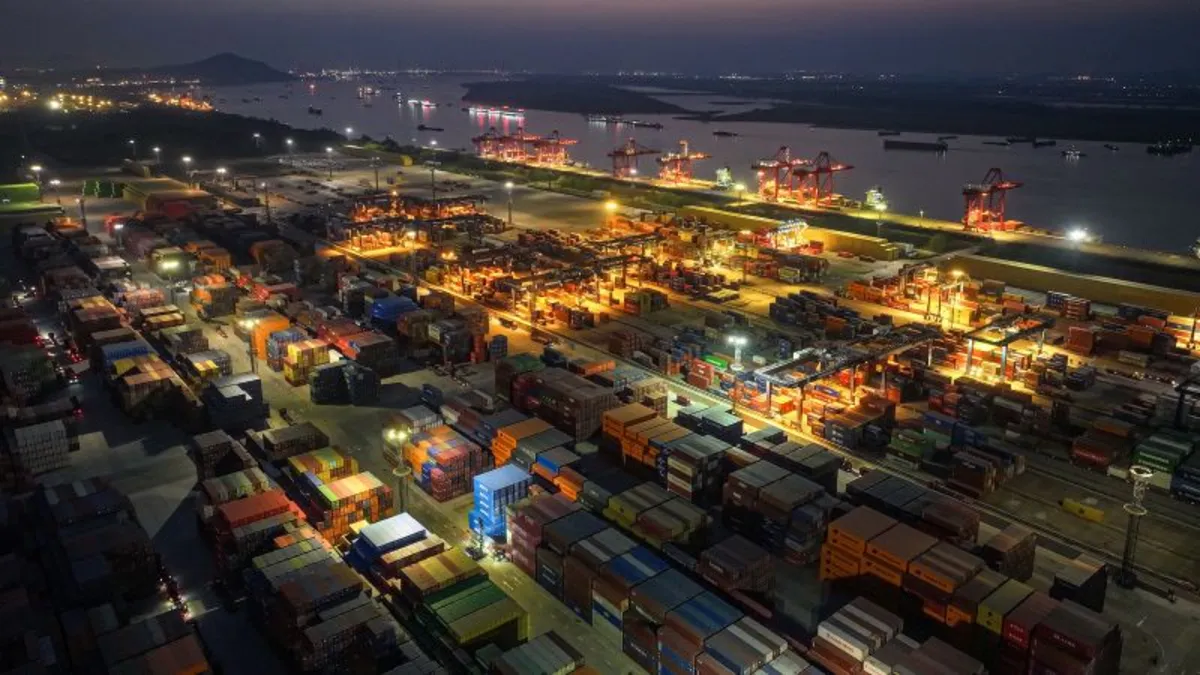
In a significant development on the global trade front, China has pledged to implement “resolute and effective measures” aimed at protecting its rights and interests. This announcement came shortly after the imposition of a staggering 104% tariff on Chinese imports by US President Donald Trump on Wednesday. During a regular news briefing, Chinese Foreign Ministry spokesperson Lin Jian expressed strong opposition to what he termed as "arbitrary tariffs" and relentless pressure from the United States. “China firmly opposes this and will never accept such domineering and bullying behavior,” he stated, underscoring the nation's stance in the ongoing trade conflict.
The escalating trade tensions between China and the US have largely manifested as a series of retaliatory tariffs. Following the latest round of tariffs that took effect on Wednesday, Lin urged the US to adopt an approach grounded in “equality, respect, and mutual benefit” if it genuinely seeks to resolve the trade war through dialogue. He warned that if the US continues to disregard the interests of both nations and the broader international community, “China will fight to the end.”
As part of Trump’s “reciprocal” tariffs initiative, US levies on Chinese imports were set to rise by 34%. However, Trump escalated the situation further by adding an additional 50% tariff after Beijing remained steadfast in its commitment to impose similar retaliatory tariffs on US goods. This marked yet another chapter in the tit-for-tat trade war, which has seen Trump impose 20% tariffs on China since his return to office.
While Beijing has not announced immediate retaliatory actions against the latest tariffs, the tone from the Chinese government, state media, and opinion leaders reflects a strong resolve to respond while keeping open the possibility for negotiations. In fact, shortly after the tariffs were enacted, China released a white paper outlining its trade and economic relations with the US, which it claims have been adversely affected by the “unilateral and protectionist measures” taken by Washington.
In a written response concerning the white paper, an unnamed official from the Chinese Commerce Ministry emphasized that China does not desire a trade war, but it will not passively observe the infringement of its legitimate rights and interests. “If the US insists on further escalating trade restrictions, China has the firm will and ample tools to take resolute countermeasures — and will see it through to the end,” the official stated. This highlights China’s readiness to engage in economic and trade dialogues through “equal consultation” to resolve mutual concerns.
Despite Beijing's confident messaging, some Chinese business owners are feeling the strain of the ongoing trade conflict. For instance, Ms. Ye, a toy seller from Shantou, expressed her worries that Trump's tariffs could jeopardize her job. “The only way to relieve my worries is to smile with bitterness. I don’t even know if I will be laid off,” she confided. Ye’s company is currently contemplating suspending shipments to the US and is considering abandoning the US market altogether due to the uncertainty.
While Chinese leader Xi Jinping has not directly addressed the latest tariffs, he emphasized the importance of building a “shared future with neighboring countries” during a high-profile Communist Party work conference. The official statement from the two-day meeting reiterated the need to consolidate strategic trust with neighboring nations and manage differences effectively. It also called for enhanced cooperation on industrial and supply chains, indicating China's intent to capitalize on the disruptions caused by the trade crisis.
China's recent diplomatic efforts come at a time when its relations with neighboring countries are reportedly at their best in modern history. This shift occurs amid increasing interconnections between regional dynamics and global changes. Last month, Beijing conducted economic discussions with Japan and South Korea, both of which have faced significant tariffs from the US. These countries are now actively seeking negotiations with Washington to lower those tariffs.
As the tariff war continues to impact global supply chains, nations in Southeast Asia—key manufacturing hubs—have also felt the repercussions. Some countries have even reached out to Trump, urging him to delay the tariffs, as they seek to navigate the challenging landscape created by the ongoing trade conflict. Trump himself remarked on the situation, describing foreign leaders as eager to negotiate to avoid the impending tariffs: “Please, please sir, make a deal. I’ll do anything sir.”
This ongoing saga in US-China relations is a crucial focal point in international trade discussions, with both nations weighing their options as they strive for a balanced resolution to the burgeoning conflict.